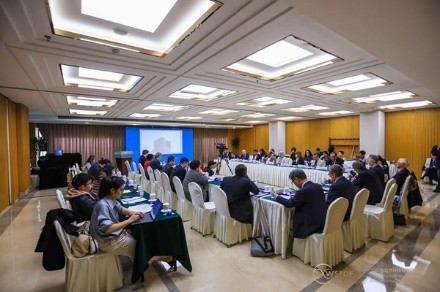
 0 Comment(s)
0 Comment(s) Print
Print E-mail China.org.cn, November 1, 2024
E-mail China.org.cn, November 1, 2024
Attendees take part in the "Science and Technology for Risk-Informed Sustainable Development" thematic session at the 2024 World Science and Technology Development Forum (WSTDF), in Beijing, Oct. 24, 2024. [Photo courtesy of WSTDF]
The 2024 World Science and Technology Development Forum (WSTDF) held a thematic session in Beijing on Oct. 24 focused on "Science and Technology for Risk-Informed Sustainable Development." Leading representatives of policymakers, scholars and private sector took part in the event, discussing how to mobilize science and technology to navigate emerging global risks and build a safer, more inclusive and sustainable future.
The session was hosted by the Integrated Research on Disaster Risk (IRDR), the International Society for Digital Earth (ISDE) and the International Research Center of Big Data for Sustainable Development Goals (CBAS), and supported by the International Science Council (ISC) and the U.N. Office for Disaster Risk Reduction (UNDRR). Salvatore Arico, CEO of the ISC, and Marco Toscano-Rivalta, head of UNDRR's Regional Office for Asia and the Pacific, co-chaired the event, and it was co-moderated by IRDR Executive Director Yang Saini and Senior Science Officer Han Qunli.
Collaboration and shared solutions for global risks
As climate change accelerates and disaster risks become more complex, the importance of international scientific cooperation grows ever more crucial. Wu Guoxiong, an academician at the Chinese Academy of Sciences (CAS) and a researcher at the CAS Institute of Atmospheric Physics, highlighted the significance of international cooperation in early warnings for disasters. He pointed to the Sub-seasonal to Seasonal (S2S) Prediction Project as a successful model of global collaboration. Countries including China, the United Kingdom, the United States and Japan participate in the project, which allows real-time comparisons of their climate prediction models, improving collective capacity to address climate-related disasters.
Rajib Shaw, chair of the UNDRR Asia-Pacific Scientific and Technical Advisory Group, emphasized the need for increased global cooperation to bridge technological divides. He noted that technologies such as artificial intelligence and drones are vital for disaster risk reduction, yet many Global South countries lack access to these advanced tools, making the collaboration essential.
Manon Burger, biochemistry publishing director for Elsevier, underlined the importance of open access to scientific research in fostering global knowledge sharing. "We publish more than 3,000 journals, many of which are available open access, ensuring that researchers worldwide can stay updated on the latest scientific advancements," Burger said. She also introduced Elsevier Foundation, which has partnered with over 100 institutions in 70 countries since it was established in 2005, offering approximately $16 million in funding for initiatives supporting climate action and inclusive health care.
Josephine Ngaira, professor of geography (climatology) in the School of Disaster Management and Humanitarian Assistance at Masinde Muliro University of Science and Technology in Kenya, stressed the need to address the specific challenges of grassroots communities and vulnerable populations in disaster risk management. She advocated for inclusive models that ensure technological benefits reach all levels of society, advancing sustainable development worldwide.
DRR education and empowerment of young professionals
Young people are a driving force behind technological innovation and sustainable development. Shabhaz Khan, director of the UNESCO Regional Office for East Asia, stated that the youth is highly recognized by the United Nations, and can be mobilized and engaged in pilot disaster research activities.
Salvatore Arico, CEO of the ISC, underscored the importance of interdisciplinary training for young researchers. He pointed out that current education systems often remain siloed within single disciplines, whereas solving complex global issues requires interdisciplinary research and training. He advocated for education reforms to provide young scientists with more diverse learning opportunities and to encourage cross-sector exploration.
Khamarrul Azahari Razak, director of Malaysia's Disaster Preparedness and Prevention Center, emphasized the importance of investing in human resources and listening to the voices of young people. Meanwhile, professor Christopher Garimoi Orach from the School of Public Health at Makerere University in Uganda, highlighted the need to strengthen disaster risk management education in developing countries, particularly at the higher education level. He noted that training specialists in disaster risk reduction is crucial for future global risk preparedness.
Building social resilience through government policies
In tackling global risks, national policies and government support are the keys. Robert Walker, fellow of the Royal Society of Arts and the Academy of Social Sciences Academy of UK and professor at the University of Oxford, stated that social policy should focus on enhancing social resilience by providing people with a sense of security, thus reducing their anxieties and enabling them to contribute to disaster risk reduction. Walker praised China's efforts in promoting social security and resilience through advancing common prosperity, poverty reduction and energy transition.
Salvatore Arico further emphasized that collaboration between governments, communities and scientists is essential for addressing global challenges such as climate change, land degradation and declining water quality. He noted that considering the practical applicability of scientific methods from the beginning of policy design would help enhance implementation effectiveness and ensure technology-driven progress.
Rajib Shaw called for greater adaptability in governance mechanisms. Given the existing gap between sci-tech advancements and governance structures, he suggested policy adjustments from governments to facilitate adaptive governance, thus ensuing effective application of scientific tools in disaster risk reduction and management.